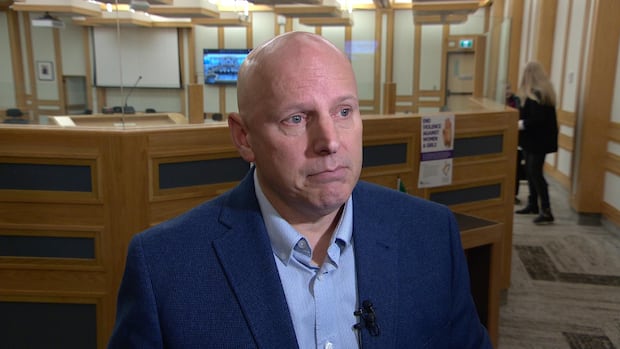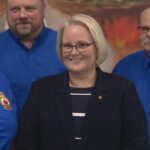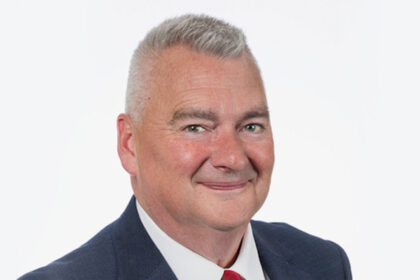SaskatoonCoun. Robert Pearce spoke out against the idea of a dedicated fee to address homelessness at a city council committee meeting where a survey of residents was debated. City survey suggests most in Saskatoon would pay to address the homelessness crisisPhil Tank · CBC News · Posted: Nov 12, 2025 4:30 PM EST | Last Updated: 1 hour agoListen to this articleEstimated 5 minutesThe audio version of this article is generated by text-to-speech, a technology based on artificial intelligence.Ward 3 Coun. Robert Pearce rejected the idea of a special fee for homelessness despite the results of a city survey that suggests most people in Saskatoon support such a fee. (Adam Bent/CBC)A Saskatoon city councillor who represents a neighbourhood with a contentious homeless shelter rejected Wednesday the idea of a special fee to address the unhoused crisis.Coun. Robert Pearce spoke out against the idea at a city council committee meeting where a survey of residents was debated. The survey revealed that 63 per cent of respondents would be willing to pay an extra monthly fee to address homelessness in Saskatoon. Nearly a third of respondents cited a fee of $5 to $9 per month.Pearce said people in his west-side ward, which includes a 106-bed homeless shelter next to the Fairhaven neighbourhood, and the adjacent ward are already paying extra for the crisis.Pearce said people in his ward sent him messages and comments in response to a question he posed about the prospect of an extra homelessness fee.“And when I read the comments and I read the messages, it all centres around the fact that Ward 3 … has already been paying significant fees for homelessness,” Pearce told the governance and priorities committee, “in terms of thefts, losses, damages, vandalism, clean-up fees.“All these things are a real cost to people in parts of this city that are not necessarily borne by everybody in the city.”Pearce said he received 148 responses to his informal survey and 98 per cent were opposed to any sort of homelessness levy.Such a fee would blur the lines between the responsibilities of different levels of government and create uncertainty about how the revenue would be divided, he said.Pearce added that many of the organizations helping vulnerable people in Saskatoon accept donations, so people can give money if they want.WATCH | Housing and homelessness tops the City of Saskatoon’s strategic planning:Housing and homelessness tops the City of Saskatoon’s strategic planningSaskatoon Mayor Cynthia Block joined Saskatoon Morning to talk about the city’s long-term planning. Block said housing and homelessness is at the top of the priority list.The survey by Forum Research Inc. on behalf of city hall was conducted with 398 online panelists from July 11 to Sept. 2. The survey lacks a margin of error since it does not represent a random sampling of residents.Nearly a third of respondents named homelessness as the city’s top issue. It tops the survey for the third straight year, but by 12 points more than last year.Coun. Bev Dubois wondered whether the 398 people surveyed accurately represents the population of Saskatoon, which has been estimated at 316,342. “Do we actually, honest to goodness, feel comfortable that 398 respondents, that that gives us good information to deal with the things [city administrators have] identified in this report?” Dubois asked.She also questioned whether the city should have paid the estimated $25,000 for the survey since it fell short of the city’s target of 800 respondents.Administrative staff told Dubois the target number is difficult to achieve since people have grown tired of surveys and getting respondents is challenging.City hall embraces AIIf you’ve ever wondered who makes decisions about chemical levels at Saskatoon’s water treatment plant, you should probably be asking what instead of who.City council received and approved a report on artificial intelligence at city hall that revealed the extent to which AI tools are already employed.The report details a list of AI initiatives, including using “machine learning algorithms” to determine the chemical dosage at the water treatment plant. That use of AI has reduced waste and improved accuracy, the report says.AI is also being used to analyze heating, ventilation and cooling systems at city hall, the Shaw Centre and the Lawson Civic Centre.In the future, people contacting the building standards department could end up conversing with an AI assistant or chatbot, based on the information in the report.“It’s all very new,” Mayor Cynthia Block said. “It’s all very innovative and could be extraordinarily transformative and [I] appreciate that we need to move cautiously.”Two-tiered fees on budget agendaCity council will consider higher fees for out-of-towners to use city-run pools, rinks and recreation facilities.The committee voted unanimously to consider a report on higher fees for non-residents at budget deliberations starting Nov. 25.Dubois requested the report at last month’s meeting of the same committee.It reveals that even though a small fraction of people using the city’s recreational facilities come from outside Saskatoon, raising fees would increase revenue, even though it would decrease the number of people using the venues.The report also shows that five communities in Saskatchewan share a funding arrangement for such facilities with neighbouring municipalities.The starting point for this year’s two-year budget debate is an 8.23 per cent property tax increase next year, followed by a 5.95 per cent hike in 2027.Next year’s tax increase would be the highest in Saskatoon history for the city’s portion of property tax if council decides against any change. The previous high was in 2014 at 7.43 per cent.ABOUT THE AUTHORPhil Tank is a journalist in Saskatoon.
Saskatoon councillor pans special fee for response to homelessness











